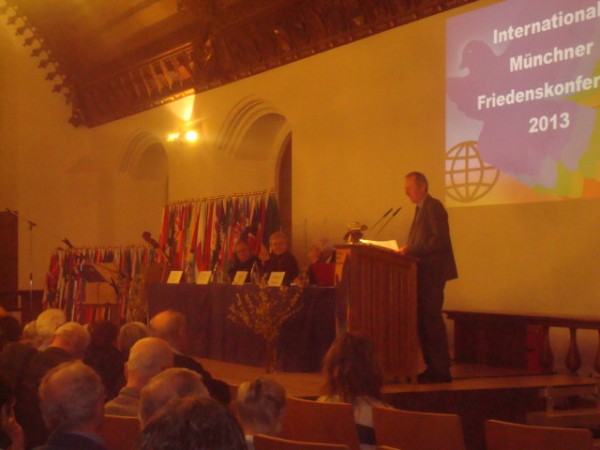By Ricardo Arias
With the slogan “Building Peace and Justice, say NO to war” the International Peace Conference took place in Munich, Germany between the 1st and 3rd of February 2013.
The context: the logic of peace or the logic of war
This conference is an event that takes place every year at more or less the same time, three people committed to the themes of Peace and Nonviolence and who have carried out research or implementation of nonviolent solutions to build peace and justice are invited.
Since the year 2005, when the Peace Conference started, a change of direction has been called for regarding present day world problems and conflicts and their resolution through civil actions instead of military interventions.
The Peace Conference is therefore a response to the annual “Security Conference” that also takes place in Munich and which gathers together high level political and military strategists, and also counts on the participation of private businesses. The aim of this “security conference” is to reinforce the idea that the “security of the people” depends on “military force”, especially in moments of crisis and war.
The International Forum …
This took place on Saturday the 2nd of February with the presentation of three themes:
1. The logic of peace or the logic of “security”, but Hanne-Margret Birckenbach from Germany, a University Professor and researcher in processes of international peace and conflicts.
Through her investigation into European and international integration, EU-Russia relations and the transformations in Eastern Europe, she has developed a concrete concept for the implementation of a Peace logic. She has worked in two directions. Firstly, overcoming misinformation, divulging the concrete facts that turned into as yet unknown solutions to conflicts which never erupted. Secondly, the development of points of views, ideas and attitudes that fight against the belief that conflict solutions must come only from traditional politics or the military, instead of coming from the creativity of the people or groups involved.
In this context she presented peace as a creation that needs external and internal resources. So, if external resources go towards military solutions then they cannot go towards peace actions, thereby limiting the resources for peaceful solutions. She illustrated this case with the example of the present situation in Mali.
2. ‘Nonviolent ways of Regime Change’ (1), by Tomás Hirsch from Chile, co-founder of the Chilean Humanist Party and ex-candidate for the presidential election.
Hirsch presented the different kinds of violence that human beings suffer today, in Chile and in any other part of the planet: physical, economic, psychological, generational, religious, sexual and racial. In the case of Chile, he explained how the great economic inequality and distribution of wealth are the products of neo-liberal policies put in place at the time of the dictatorship. He broadened the look to other parts of the world and other dangers, such as nuclear weapons. He showed the urgency to create a consciousness of Peace and disarmament, calling through all the means at our disposal for: global nuclear disarmament, the immediate withdrawal of invading troops in occupied territories, the progressive and proportional reduction of weapons, the signing of non-aggression treaties between countries and the renunciation by governments of the use of wars as a means to resolve conflicts.
He pointed out that human beings will stop using violence when it has been eradicated from each one of us and that this demands effort to come about. He said that this will not be easy as it touches on the essence of human beings and has to do with the answer to fundamental questions related to the Meaning of Live, who we are and where we’re going.
He concluded his presentation saying that through the promotion of nonviolent actions every day, actions that end in others and that seek the goodness of human beings, then we will leave dignified living conditions for future generations and guarantee the continuity of human beings in an open, free and bright future. To read the complete speech by Hirsch, click here.
3. ‘Oil wars or peace with the sun’, by the journalist and writer, Franz Alt from Germany. He developed the ecological point of view with the hypothesis that the struggle for control of oil is the main cause of international conflicts. So, a development of the human economy based on the use of alternative energy, principally solar energy, would be a response to decrease conflicts.
The forum of interchange …
This took place between the panellists and the public on Saturday the 2nd of February and allowed different subjects to be touched on. The subject of this interchange will be dealt with in a future article on Pressenza.
The moment of street expression…
This took place on Saturday afternoon in the streets of the centre of Munich with a demonstration denouncing the “Security Conference” and the military expansion of NATO, some 5000 people took part.
Conference website: www.friedenskonferenz.info
(1) The Augusto Pinochet dictatorship lasted from 1973 to 1990.










